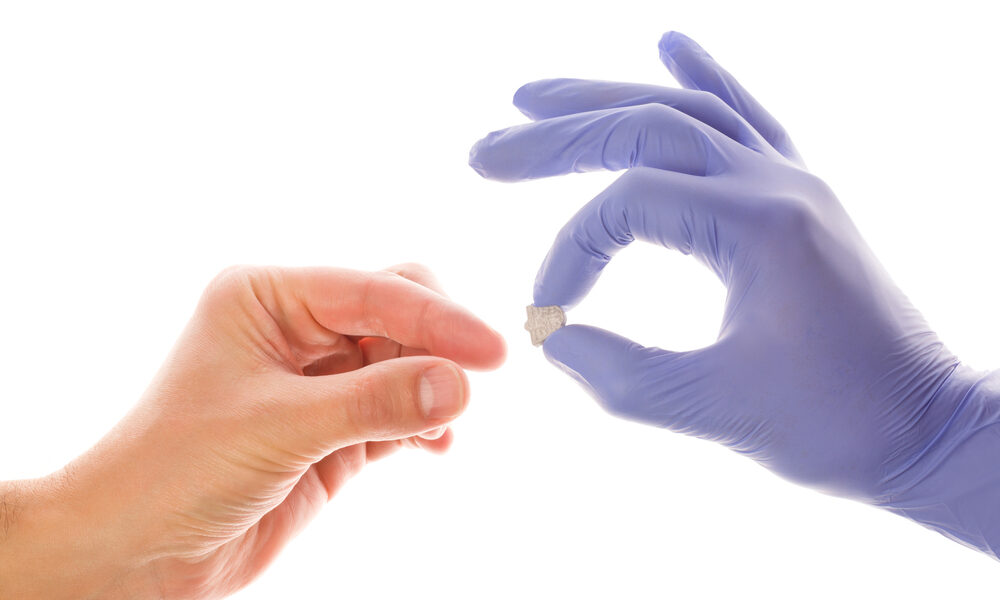As we collectively venture further into this new era of psychedelic renaissance, psilocybin and ketamine tend to dominate the conversation in regard to their therapeutic potential for treating conditions like post-traumatic stress disorder (PTSD) and treatment-resistant depression.
Psychedelic advocates also expect the Food and Drug Administration (FDA) to approve MDMA as a PTSD treatment within the next two years, but couples are already utilizing the drug to strengthen their relationships, TIME reports.
MDMA’s Healing Potential For Couples
The publication spoke with a couple who were able to reach a new understanding under the influence of the drug, also known as ecstasy and often used in rave and club scenes. According to the report, MDMA allowed the pair to voice their true feelings and listen to one another, discussing issues around their nearly 10-year marriage from chores to parenting and sex.
Now, the New Mexico couple calls a babysitter, goes out to dinner and spends the night in a fancy hotel where they tackle their own DIY version of MDMA-assisted couples counseling.
Albert Garcia-Romeu, an assistant professor of psychiatry and behavioral sciences at Johns Hopkins Medicine, studies psychedelics and told TIME that there are many neurobiological reasons to think that MDMA could assist in couples therapy. The drug stimulates the activity of “feel-good” neurotransmitters in the brain, essentially quieting the parts of the brain that respond to threats, Garcia-Romeu said.
Additionally, MDMA can release hormones associated with bonding, like oxytocin, which allows people to “feel more emotionally open and empathetic and less triggered by threats or difficult emotional states,” he said.
Research has also suggested that MDMA enables people to revisit difficult or traumatic topics without emotional responses, which may partially explain its efficacy in treating people with PTSD. This can also be a perk in relation to couples therapy.
“If there’s a long-held resentment or disagreement in a couple and people are too hurt or too wounded or too guarded to talk about that, but then you’re able to use the drug to temporarily get guards down…that can really help clear out a lot of emotional baggage,” Garcia-Romeu said.
A Renewed Interest
While using MDMA within couples counseling is not currently, the idea isn’t brand new either.
A number of therapists legally used MDMA in couples counseling in the 1970s and ‘80s, one being Rick Ingrasci, who had a psychotherapeutic practice in Watertown, Massachusetts in the early 1980s. He was convinced of the therapeutic potential of MDMA and treated 100 patients in about 150 sessions from 1980 to 1985. One-third of those sessions were with couples.
Ingrasci would wait for the onset of the drug before encouraging the couple to talk about what they thought or felt in the present moment, continuing the “gentle, non-directive process” over the next two hours.
“It puts a person in an unbelievable open frame of mind … the expanded capacity for self-awareness, the expanded sensitivity, the increased ability to share feelings. All that’s attributable … to the lowered fear and anxiety induced by this drug,” Ingrasci described.
Dr. George Greer was another psychiatrist who treated people with MDMA from 1980 to 1983, publishing a paper documenting the drug’s effects on 29 people — 21 of whom took the drug in couples or groups. He wrote that every person who took MDMA with their partner or a group “experienced more closeness and/or enhanced communication, and two found it easier to receive compliments and criticism.”
The New Frontier: MDMA as a Tool, Not a Quick Fix
While the U.S. government classified MDMA as a Schedule I drug in 1985, the recent growing acceptance surrounding psychedelics and their potential for treating mental health conditions has elevated the drug’s potential once more. The drug could act once more as a tool to assist in couples therapy down the line, after the FDA approves its use for PTSD and scientists conduct further research.
Though, many couples and therapists aren’t waiting. That said, psychiatric professionals in the space caution that psychedelics won’t be a quick solution to instantly fix all problems in a relationship.
Catherin Auman, a California psychotherapist who coaches clients on integrating psychedelics into their lives, told the publication that both partners must be on the same page about what psychedelics can and can’t do. For example, if a bond or trust has been broken, MDMA or other drugs may not be enough to fix them.
David Ford, a Los Angeles-based entrepreneur, flew out to New York City with his wife to try out an MDMA-assisted session, dissecting their emotions, history and navigating their relationship, with guidance from their clinicians. He said the effects were transformative for his marriage, though he pointed to Auman’s point while speaking with TIME.
“There were just these rocks in our relationship that we would stumble over again and again,” Ford said. “Those rocks are still there, and occasionally they get stumbled over, but we’re much better at recovering.”

